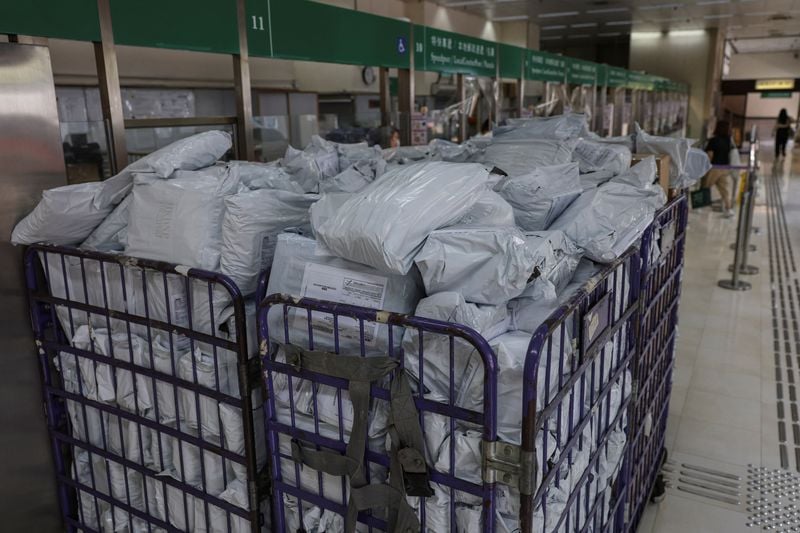By
Reuters
Published
May 2, 2025
As the United States ends its tariff exemption for small parcels on Friday, several retailers have already halted shipments to American customers. Others are seeking temporary workarounds, hoping the new tariff rate may eventually be revised.

The repeal of the “de minimis” rule—which allowed duty-free treatment for e-commerce packages under $800 from China and Hong Kong—subjects most of these imports to tariffs as high as 145%. U.S. President Donald Trump announced the change last month, disrupting global e-commerce and prompting retaliation from Beijing.
British beauty brand Space NK has paused all e-commerce orders and shipping to the U.S. “to avoid incorrect or additional costs being applied to our customers’ orders,” the company said in a notice on Wednesday.
Understance, a Vancouver-based lingerie brand that manufactures in China, told customers via Instagram it would stop shipping to the U.S. due to the new tariffs. The company may resume once policies become clearer.
“We’re going from zero to 145%, which is really untenable for companies and for customers,” said Cindy Allen, CEO of global trade consultancy Trade Force Multiplier. “I’ve seen a lot of small-to medium-sized businesses just choose to exit the market altogether.”
Import charges now vary by shipment method. The U.S. Postal Service applies a tariff of 120% of the item’s value or $100 per package. According to official guidance, U.S. Customs and Border Protection plans to raise that fee to $200 in June.
Price hikes underway
Retailers that continue to serve the U.S. market are adjusting prices to offset the impact.
British clothing label Oh Polly has raised prices in the U.S. by 20% compared to other markets. Managing director Mike Branney noted that further increases may follow, depending on how trade dynamics evolve.
Shein, the Singapore-based fast-fashion platform whose goods are largely made in China, addressed U.S. customers in an Instagram post on Thursday: “Some products may be priced differently than before, but most of our collections remain as affordable as ever.” The U.S. remains Shein’s largest market.
Temu, the global e-commerce arm of PDD Holdings, has started labeling items already in U.S. warehouses as “Local” and informing shoppers that those products carry no import charges. However, stock imported before the May 2 deadline will eventually run out.
In preparation for the change, both Shein and Temu have reduced their digital advertising in the U.S.—a sign the companies anticipate potential drops in consumer demand. Neither company immediately responded to requests for comment.
E-commerce fallout and compliance burdens
Originally created to simplify international shopping, the de minimis rule has come under bipartisan criticism for enabling the smuggling of fentanyl ingredients and flooding the U.S. with low-cost Chinese goods—primarily apparel, toys and furniture through platforms like Shein, Temu and Amazon Haul.
According to U.S. Customs and Border Protection, shipments qualifying under the rule accounted for 97% of intellectual property infringement-related cargo seizures in 2024.
With the exemption removed, retailers must now submit detailed documentation to customs specifying the origin of each product component. The increased administrative burden, coupled with steep tariffs, discourages many smaller businesses from serving the U.S. market.
UPS CEO Carol Tomé noted that many of the company’s small- and medium-sized clients source all their goods from China, making them especially vulnerable to these changes.
Etsy announced it would simplify the process for vendors to indicate their country of origin to assist sellers. Tariffs are based on where a product is made—not where it is shipped from.
Physical retailers may gain ground
While the policy shift has disrupted e-commerce, it may create opportunities for retailers that operate physical stores or rely less on Chinese manufacturing.
Primark, the British fast-fashion chain that sells only through brick-and-mortar locations in the U.S., expects to benefit. The company does not offer online shopping in the American market.
“With prices going up from this part of the trade, I wonder if some Americans might start going back to shopping centers to find value there,” said George Weston, CEO of Associated British Foods, which owns Primark.
Trump’s justification and broader implications
Trump has defended ending the de minimis exemption, calling it “a big scam going on against our country,” and accusing foreign e-commerce platforms of exploiting the rule at the expense of U.S. small businesses. “We put an end to it,” he stated during a cabinet meeting on Wednesday. He acknowledged the likely consumer impact, suggesting children might now have “two dolls instead of 30 dolls,” and those two may cost “a couple of bucks more.”
The exemption, introduced in 1938, originally allowed U.S. travelers to bring home goods worth up to $5 without declaring them. The threshold rose to $800 in 2016. In fiscal 2024, roughly 1.36 billion shipments entered the country under the rule—more than 90% of all cargo—with about 60% originating from China.
As of Friday, parcels under $800 face a 120% levy or a flat $100 fee, which increases to $200 in June. This is in addition to the existing 145% tariff on most Chinese imports as part of the broader U.S.–China trade war.
The White House also accuses Chinese sellers of using “deceptive shipping practices” to exploit the loophole. U.S. industry associations have long pushed to close it, arguing that it created unfair competition.
Trump further claimed the rise in small-package imports contributed to the entry of dangerous substances like fentanyl. “These exports play a significant role,” he stated in an April executive order.
DHL Group CEO Tobias Meyer cautiously responded to the changes, noting that the impact will depend on how the U.S. defines formal versus informal customs clearances. He added that formal entry requires additional data points, which could complicate logistics for smaller parcels.
FashionNetwork.com with Reuters and Bloomberg
© Thomson Reuters 2025 All rights reserved.




